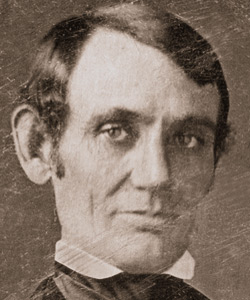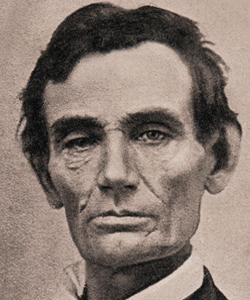By Peter Hass (Summer 2022)

In a letter sent in 1841 to his friend’s sister Mary Speed, Abraham Lincoln wrote about a boat trip that included a group of slaves being taken for sale. He noted that despite them being in “the worst of human conditions,” they were singing, which he believed meant God was giving them the gift of tolerating this condition and that the human spirit could find happiness even in these conditions. Lincoln almost seemed in shock at this discovery, and over time slavery grew only more evil in his view. Yet this idea that slaves could be happy despite their plight sharply contrasts with the popular image of Lincoln as the “Great Emancipator.” How did he go from believing that slaves were happy under slavery to wanting to end it? To find out why, it is best to look at other letters he wrote 14 years later to see the evolution of his views and how they would ultimately shape him into an abolitionist still held on to his moderate idea of getting change by laws instead of force.

In a letter to conservative judge George Robertson in 1855, Lincoln revealed more radical and anti-slavery beliefs. He commented that Robertson’s idea of a “peaceful extinction of slavery” sounded good at face value, but Lincoln ultimately believed that “there is no peaceful extinction of slavery in prospect for us.” Any attempt at gradually elimination would fail. He also commented on how the line in the Declaration of Independence, that all men are created equal, was not being fulfilled. Lincoln saw that slavery and freedom could not coexist in one country: “Can we, as a nation, continue together permanently–forever–half slave, and half free?” The way he posed the question suggests that Lincoln thought the answer was, “no.”
His next letter to Joshua Speed, brother of Mary Speed, in 1855 not only solidifies his views on slavery but also shows another principle of his which is his belief in law and order being essential for change to happen naturally. Here he remembered the slaves singing on that earlier boat trip; now he saw only misery and was tormented by this earlier belief that slaves could find any happiness with their plight. However, we also see the evolution of a second line of thought about slavery that could contradict the first: that there were limits to what those in power could do. With power comes responsibility, and while Lincoln’s view of slavery grew increasingly negative, his appreciation for respecting law grew as his own status increased. He noted that change must come lawfully instead of being forced. He gave the example of Kansas, saying that while his friend would “send an army and hang the leaders” , he would instead have Kansas “admitted to the union, or the union would be dissolved”. He backed up this claim by referring to Nebraska, where law was a tool of violence rather than of democratic order and a tool of oppression, because slaveholders could expand their influence and control the country with their higher number of votes. He agreed that maintaining slavery was hypocritical against the ideals of the Declaration of Independence, and that this needed to be solved. But democratic procedures had to be followed, or something equally bad—politics as violence—could occur and the country could fall apart.
His last two letters to Joshua Speed and George Robertson reveal the evolution that Lincoln went through along with the principles he kept with his change in views with how behind the scenes of his political career of being a moderate that only cared about stopping the expansion of slavery, he changed with how he wanted to abolish slavery while also holding to his previous principle of wanting to do it through legal ways like laws. This private side of Lincoln would start to be revealed with his first inaugural address in 1861 where he said that despite not having any purpose in “interfering with the institution of slavery in the states”, he still stood up against the confederates as he saw them as lawless group who were embracing the evils of “anarchy” and “despotism”. Along with continuing to preach his idea of change through law, he also alluded to his antislavery with how he felt that those attacking slavery “cannot be perfectly cured” with their desire to end slavery. With the war, he would further develop his abolitionist views and gain the reputation of the great emancipator that all today know him as.
